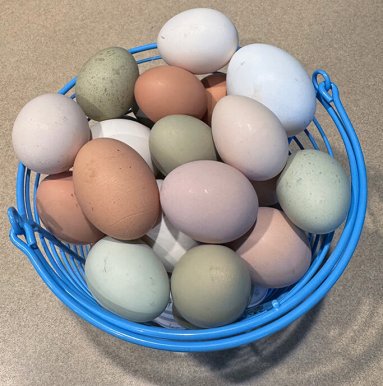Price of eggs soar; what can we do?

KATHERINE GROSSMAN PHOTO
There seems to be a healthy respect for raising chickens since eggs have doubled in price seemingly overnight. The price of a dozen eggs is at a record high since the recent ongoing bird flu. According to U.S. Bureau of Labor statistics, prices are the highest since the nations last bird flu in 2015 with the average price coming in about $4.95 in January. In August of 2023, a dozen eggs would only set you back $2.04.
Some stores across the country exceed the above price and have soared to nearly (and in some cases over) $10.00 per dozen for the little shell with goodness inside.
Prices are not expected to go down. They tend to spike around Easter, which is just around the corner, so who knows?
When a virus is found on a fowl farm, the entire flock must be slaughtered. Statistics provided note that 158 million birds have been killed this round of the flu virus. According to health officials, they say the threat to humans remains low with eggs and poultry remaining safe to eat.
A couple reasons for a lack of eggs right now is the virus and demand for eggs being high. Farmers are also facing higher feed bills to boot.
In many rural areas farmers and homeowners raise a few chickens for their own use, whether it be for the meat or eggs or perhaps both. That is true in Ripley County. It’s not uncommon to see a sign “Eggs for sale”. Even those eggs have had a slight increase.
But what if you want to raise your own chickens?
You just need a small plot of ground – even people who live in town could have a few chickens. For example, the Town of Osgood has an ordinance that allows up to 12 female chickens – no roosters. This is for one’s private/personal use with the property owner in compliance with the rules set forth in the ordinance.
There are rules with raising chickens in town so as to not disturb your neighbors, whether it be from the sight, sound, or smell of the fowl creatures. If you’re not incompliance, the fine could be more than it’s worth to raise them!
Check with your individual town to see what the rules are for raising chickens.
Raising chickens is very rewarding when it comes to egg production. And they almost seem like “pets” when you go out to feed and water them interacting with them daily. Choosing the right breed of chicken can also make a difference. Some lay more eggs, live longer and have longer productive years.
For both meat and egg production the Golden Comet and Rhode Island Red are favorites. They are both hardy with the first being friendly and the latter being bossy. The Barred Plymouth Rock and White Leghorn are also good egg layers with the latter being the best for eggs. All the above chickens lay an average of 250-300 per year. Of course, there are many other breeds to also choose from. The Wyandotte is beautiful with laced feathers in various colors and make great pets. They can withstand cold climates and can lay up to 240 eggs annually.
As Spring approaches, hatcheries, farms, and farm stores will be having the little chicks for sale. They also will need proper care but can be managed easily.
If all else fails, there’s always the grocery store. While some shelves have taken a hit as people rush to get the ‘golden’ eggs, and prices are high, remember the nutritional value. Also know that many local grocers aren’t making money off the high prices. One such grocer showed The Versailles Republican his invoice of what the eggs cost him, and how much he was charging, and it was hard to believe he would even stock them.

